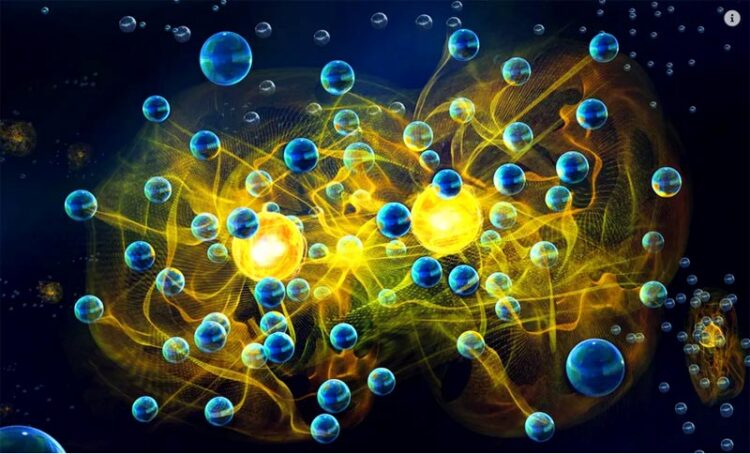Interacting polarons

Illustration von Polaronen als gelbe Kugeln
Potassium atoms (yellow) surrounded by lithium atoms (blue) form polarons that interact with each other.
(c) Harald Ritsch / IQOQI Innsbruck
In physics, quasiparticles are used to describe complex processes in solids. In ultracold quantum gases, these quasiparticles can be reproduced and studied. Now, for the first time, Austrian scientists led by Rudolf Grimm have been able to observe in experiments how Fermi polarons – a special type of quasiparticle – can interact with each other. Their findings have been published in Nature Physics.
An electron moving through a solid generates a polarization in its environment due to its electric charge. In his theoretical considerations, the Russian physicist Lev Landau extended the description of such particles by their interaction with the environment and spoke of quasiparticles. More than ten years ago, the team led by Rudolf Grimm at the Institute of Quantum Optics and Quantum Information (IQQOI) of the Austrian Academy of Sciences (ÖAW) and the Department of Experimental Physics of the University of Innsbruck succeeded in generating such quasiparticles for both attractive and repulsive interactions with the environment.
For this purpose, the scientists use an ultracold quantum gas consisting of lithium and potassium atoms in a vacuum chamber. With the help of magnetic fields, they control the interactions between the particles, and by means of radio-frequency pulses push the potassium atoms into a state in which they attract or repel the lithium atoms surrounding them. In this way, the researchers simulate a complex state similar to the one produced in the solid state by a free electron.
A Closer Look at Solids
Now, the scientists led by Rudolf Grimm have been able to generate several such quasiparticles simultaneously in the quantum gas and observe their interactions with each other. „In a naive notion, one would assume that polarons always attract each other, regardless of whether their interaction with the environment is attractive or repulsive,” says the experimental physicist. „However, this is not the case. We see attractive interaction in bosonic polarons, repulsive interaction in fermionic polarons. Here, quantum statistics plays a crucial role.” The researchers have now been able to demonstrate this behavior, which in principle already follows as a consequence of Landau’s theory, in an experiment for the first time. The theoretical calculations for this were done by colleagues from Mexico, Spain and Denmark. „High experimental skills were required to implement this in the laboratory”, explains Cosetta Baroni, first author of the study, “because even the smallest deviations could have skewed the measurements.”
“Such investigations provide us with insights into very fundamental mechanisms of nature and offer us excellent opportunities to study them in detail,” says Rudolf Grimm excitedly.
Wissenschaftliche Ansprechpartner:
Rudolf Grimm
Department of Experimental Physics
University of Innsbruck
+43 512 507-52410
rudolf.grimm@uibk.ac.at
https://www.ultracold.at
Originalpublikation:
Mediated interactions between Fermi polarons and the role of impurity quantum statistics. Cosetta Baroni, Bo Huang, Isabella Fritsche, Erich Dobler, Gregor Anich, Emil Kirilov, Rudolf Grimm, Miguel A. Bastarrachea-Magnani, Pietro Massignan, Georg Bruun. Nature Physics 2023 DOI: https://www.nature.com/articles/s41567-023-02248-4, arXiv: https://arxiv.org/abs/2305.04915
https://www.uibk.ac.at/en/newsroom/2023/interacting-polarons/
Media Contact
All latest news from the category: Physics and Astronomy
This area deals with the fundamental laws and building blocks of nature and how they interact, the properties and the behavior of matter, and research into space and time and their structures.
innovations-report provides in-depth reports and articles on subjects such as astrophysics, laser technologies, nuclear, quantum, particle and solid-state physics, nanotechnologies, planetary research and findings (Mars, Venus) and developments related to the Hubble Telescope.
Newest articles

Combining robotics and ChatGPT
TUM professor uses ChatGPT for choreographies with flying robots. Prof. Angela Schoellig has proved that large language models can be used safely in robotics. ChatGPT develops choreographies for up to…

How the Immune System Learns from Harmless Particles
Our lungs are bombarded by all manner of different particles every single day. Whilst some are perfectly safe for us, others—known as pathogens—have the potential to make us ill. The…

Biomarkers identified for successful treatment of bone marrow tumours
CAR T cell therapy has proven effective in treating various haematological cancers. However, not all patients respond equally well to treatment. In a recent clinical study, researchers from the University…





















